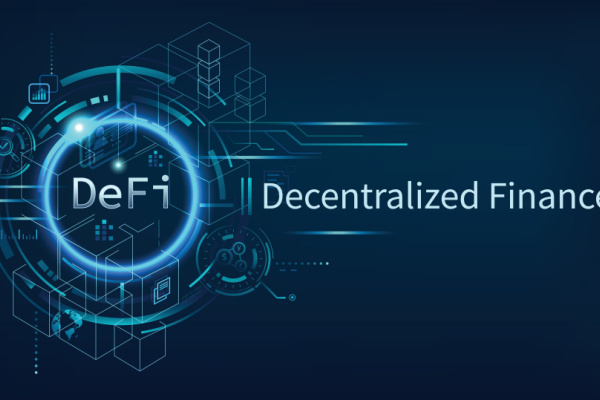


Decentralized finance or DeFi is an emerging area of blockchain innovation that aims to disrupt traditional financial services. DeFi platforms allow people to lend, borrow, trade, invest and transact without the involvement of banks or other financial institutions. Through smart contracts, DeFi applications are providing new opportunities to generate high returns, take out loans and trade assets in a decentralized way.
This blog post will explore the rise of DeFi, how it works, the opportunities it presents and the risks to be aware of. If you want to understand the cutting edge of blockchain finance, DeFi is worth paying attention to.
What exactly is decentralized finance?
Decentralized finance refers to financial applications built on blockchains like Ethereum that allow people to engage in financial transactions directly with the blockchain rather than through a financial institution. DeFi platforms cut out the middleman of banks and brokers allowing people to lend, trade, invest, transact and borrow in a decentralized, permissionless way.
DeFi is growing rapidly. The total value locked in DeFi platforms has risen from under $1 billion in early 2020 to over $12 billion. Adoption is increasing exponentially as people seek yield and new opportunities. DeFi could disrupt traditional finance. If DeFi platforms continue gaining mainstream traction, they pose a threat to banks, brokerages, insurance companies and other financial institutions. Why pay fees and deal with middlemen when you can lend, trade and transact directly with a blockchain? DeFi is not just about finance. The opportunity extends to insurance, identity, gaming and more. DeFi principles of decentralization and interoperability are being applied in many different ways. The scope extends far beyond just lending, borrowing and trading cryptocurrencies.
Some examples of popular DeFi platforms include:
· MakerDAO for lending and borrowing Dai stablecoins
· Compound for lending and borrowing crypto assets at interest
· Uniswap for trading crypto tokens without a centralized exchange
· Synthetix for trading synthetic crypto assets that track real-world assets
· Aave for earning interest on crypto deposits and borrowing assets
The key characteristics of DeFi include:
Open access: Anyone with an internet connection and crypto wallet can use DeFi platforms without needing permission.
No centralized control: DeFi protocols are built on public blockchains like Ethereum. No single entity controls the network or platforms.
Interoperability: DeFi platforms can integrate with each other seamlessly. You can lend on Compound, borrow on Aave, trade on Uniswap and use MakerDAO to manage it all.
Programmability: DeFi apps are composed of open-source smart contracts that can be programmed with additional functionality and features.
High yields: By cutting out middlemen, rates on lending, borrowing and staking in DeFi can often exceed what traditional finance offers. This attracts more people and capital to the space.
Opportunities in decentralized finance
High interest rates are a major opportunity in DeFi. Lending crypto assets on Compound or Aave can earn you 5-10% APR or higher, which far exceeds interest earned in savings accounts. Borrowing rates are also usually under 10%, lower than most personal loans.
Permissionless access means anyone can generate high yields by lending idle crypto holdings, tapping into unique trading opportunities and taking out overcollateralized loans. There are no credit checks or approvals needed to access DeFi platforms.
Borderless and secure transactions are possible in DeFi without geographic restrictions or control. As long as you have a crypto wallet, you can securely lend, trade, invest and earn high yields from anywhere in the world.
New trading opportunities emerge in DeFi that aren't possible on traditional exchanges like fully on-chain trading of synthetic stocks, crypto indexes and prediction markets. DeFi gives people access to new ways of generating alpha and hedging risk.
Of course, the rise of DeFi also comes with risks and limitations that are important to consider. I'll explore some of the main risks of decentralized finance in the next section.
Key risks and limitations of decentralized finance
While the opportunities in DeFi are exciting, you need to go in with your eyes open to the risks. Some of the major risks associated with DeFi include:
Smart contract risk: Many DeFi platforms rely on smart contracts which can have bugs, exploits or other issues that put funds at risk. Once funds have been deposited into a smart contract, they may be difficult to retrieve if there are issues.
High volatility: The value of depositing or borrowing funds in DeFi can fluctuate wildly based on the underlying asset. This could result in positions being liquidated or losing value unexpectedly.
Limited liquidity: Some DeFi platforms may not have deep liquidity, meaning it could be difficult to withdraw your funds without slippage. This is especially risky when depositing less liquid crypto assets.
Coding limitations: DeFi is still a nascent space and many apps are pushing the boundaries of blockchain coding capabilities. Some platforms may falter under high demand and scale issues as seen recently with the congestion on Ethereum.
Regulatory uncertainty: Regulations around DeFi are still unclear in most countries. Governments could potentially crack down on certain platforms and activities like peer-to-peer lending or synthetic trading which would negatively impact the space.
Conclusion
DeFi presents an opportunity to participate in an emerging area of finance and generate high yields from blockchain-based applications. However, the risks around volatility, smart contracts, liquidity, scalability and regulation all need to be considered seriously before using these platforms. As with any investment, only risk money you can afford to lose when interacting with DeFi applications.
With prudence and by starting slowly, decentralized finance can offer unique rewards. The rise of DeFi is opening a new frontier of financial freedom and innovation.
